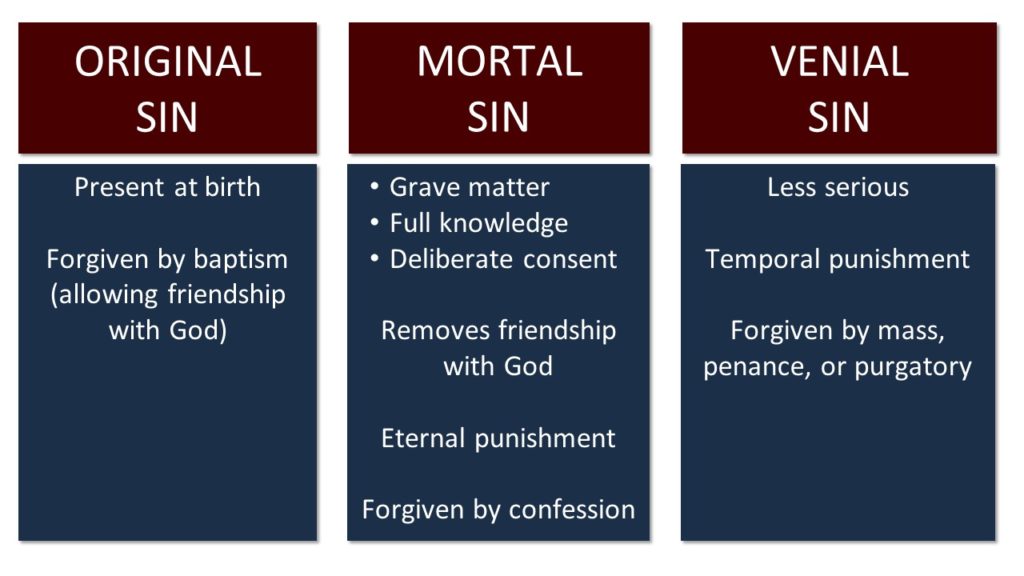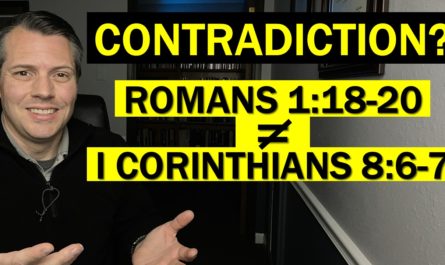Does Purgatory exist? According to the Catechism of the Catholic Church, Purgatory does exist, and one of the passages used in support of it is I Corinthians 3:15. We will look at that passage, but first, we should consider the idea of Purgatory itself. For this, we need to understand the Catholic concept of sin.
The underlying assumption is that there are different kinds of sin: original, mortal, and venial.

Original sin
Every person is born with original sin—sin inherited from Adam. Baptism removes original sin and allows a person to become friends with God.
Mortal sin
Mortal sin is serious sin that removes a person from friendship with God, resulting in “eternal punishment”–inability to have eternal life.
A mortal sin has certain requirements that all must be present (according to Catechism 1857):
1. Grave matter
2. Full knowledge
3. Deliberate consent
Confession is required to remove the guilt of mortal sin. If a person dies in mortal sin, they go to Hell.
Venial sins
These are less serious sins. Venial sins only have two of the above requirements for mortal sin and deserve temporal punishment (punishment that will be carried out in time as opposed to eternity). Venial sins can be forgiven by mass or penance.
If someone dies with unforgiven venial sins, there has to be some way to have them removed. That is where Purgatory comes in.
To a Catholic, Purgatory is a beautiful thing. They see it not as a time of punishment, but as an opportunity to be purged of venial sins and the desire to sin, making them ready to access the holy presence of God.
But we have this question: Does Purgatory actually exist?
In Catechism of the Catholic Church 1031, I Corinthians 3:15 is listed in support of Purgatory. Let us consider this passage to determine what it teaches.
I Corinthians 3:15
As always, we must consider the context of any passage we want not understand. The context here is that Paul is encouraging his readers to do their part in building the kingdom of God. Sure, we have varying skills and opportunities, but that is fine. We will receive rewards not based on our results, but on our labor (verse 8). The specific task given to Paul himself was to lay the foundation of Christ (verses 10-11). It is on that foundation that we are to build.
Now if anyone builds on this foundation with gold, silver, precious stones, wood, hay, straw, each one’s work will become clear; for the Day will declare it, because it will be revealed by fire; and the fire will test each one’s work, of what sort it is. If anyone’s work which he has built on it endures, he will receive a reward. If anyone’s work is burned, he will suffer loss; but he himself will be saved, yet so as through fire. (1 Corinthians 3:12-15)
Now, I will give you three reasons why this passage does not teach Purgatory.
1. This passage is an analogy
This is obvious. Verse 14 clearly states that it is “works” that will be either burned or not. How can you burn a work?
Verse 12 refers to these works as “gold, silver, precious stones, wood, hay, straw.” If this was not an analogy, our works would literally be these items. That simply does not make sense. Paul is using an analogy to teach that that a person’s quality of ministry is the basis for rewards.
This leads us to the next reason this does not teach Purgatory.
2. This passage is about rewards rather than sin
While Purgatory is a way of purging remaining sins from a person, this passage is about how many rewards will be received. Even if there are none, the person is still saved, “yet so as through fire.” The person is still saved, just devoid of rewards.
By the way, notice the stark difference between this passage and Purgatory. In this passage, we want something left at the end—a stack of works that will result in rewards. In Purgatory, the goal is to have nothing left at the end.
Now for the third reason this passage does not teach Purgatory.
3. The works go through fire, not the people
In I Corinthians, the works go through the fire to reveal their quality. In purgatory, the people go through the fire to be purged. This is a major difference.
Paul was concerned about the quality of the works of those who build on his ministry, not on their final purging, allowing them into God’s presence. He was dealing primarily with motives. Some may have a heap of works, but when tested according to the motives behind them, they will be left with no rewards. However, this has no bearing on their salvation.



